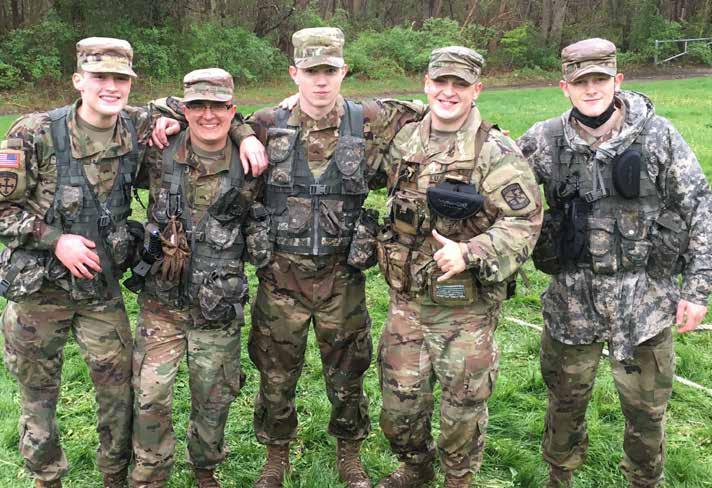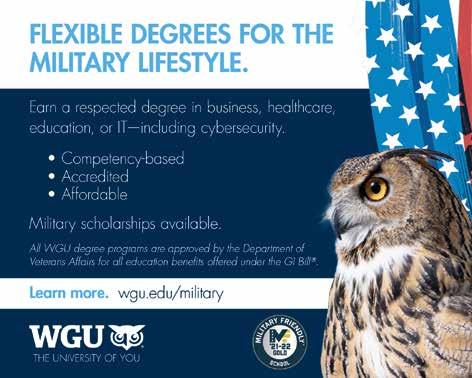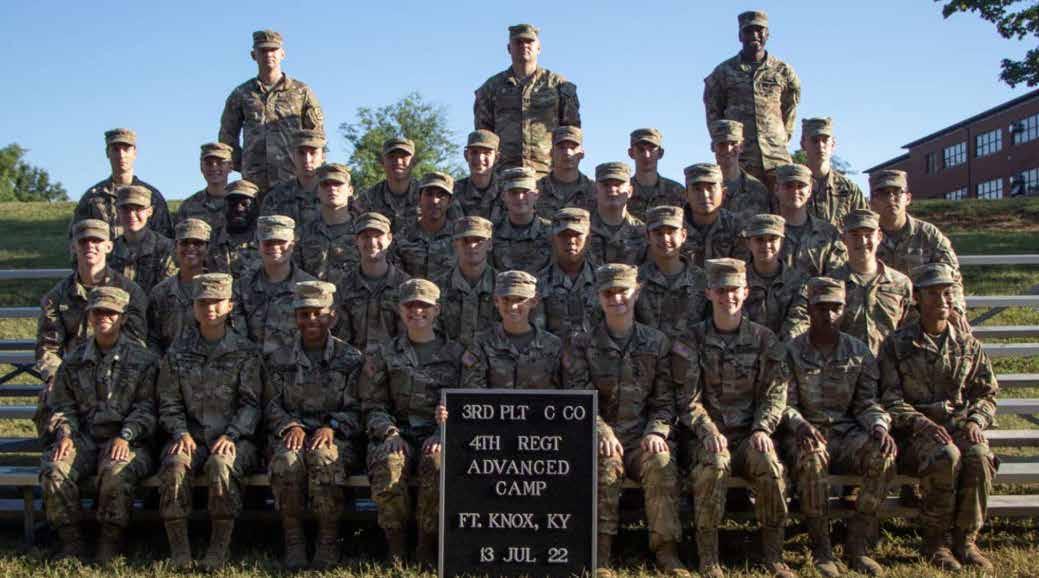
6 minute read
Reflections of a Cadet’s Life and Summer Training
REFLECTIONS ON A CADET’S LIFE AND SUMMER TRAINING
By Cadet Liam Minnick Providence College
Advertisement
Icome from a military family. My stepfather and his father were both former Marine Corps officers, and I spent most of my summers in the woods waging entire wars against hidden insurgents. We patrolled the perimeter and scouted for bogies. We crawled the property in camouflage. On more than a few Halloweens, I played Soldier and, have been competing at a club level since I was eight years old and developed a competitive attitude in all aspects of my life thanks to swimming. Having made my way from club championships to state championships to Big East conference championships, I have seen leaders at all levels. I became a student of the sport, always refining technique and racing strategy, and
attempted to bring this ideology into everything that I did.
Joining an ROTC program was somewhat last minute for me. I knew that I wanted to swim in college and was hesitant on whether I could make both athletics and cadet training work, after all swimming was something to which I had devoted my life for a decade and I was not yet ready to give it up. Ultimately, the opportunities that would come from an ROTC program drove me to apply and interview for a scholarship.
After three years of both competing at the Division One level and training as a cadet, that
last minute decision was the best I could have made. ROTC allowed me to attend my dream school and to graduate debt free. Beyond that, my cadet experiences have allowed me to develop as a person, an athlete, and a leader all at the same time. Everything that I had done growing up seemed to flow into this decision, with a need for routine and always challenging myself.
Providence College is a small and private school in Providence, Rhode Island. The school itself is mainly known for its on campus Dominican friars, basketball dominance, and Friar Dom--one of the creepiest mascots in all of college athletics. Providence offers a liberal arts education with an emphasis on the development of Western Civilization. As such, Providence strives to make wellrounded individuals who think critically and attempt to approach problems from all angles.
PC was the best choice for
Advanced Camp 10 June - 14 July. Me (center, 3rd row from the bottom). Served in Squad Leader and Platoon Sergeant positions
During my junior year, I participated in the Spring joint FTX 2021, Fort Devens, Massachusetts. “Hurry up and wait”
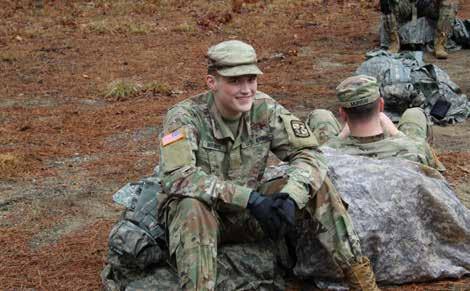
one year, Master Chief.
Becoming an Army officer always seemed to be the next logical step.
I have had many opportunities to see what leadership excellence looks like through athletics, especially through swimming. I me and perfectly fit my unique situation. My coach, John O’Neill, listened to my desire both to swim and to serve. He believed in my potential, that I could do ROTC while being on the team. That enthusiasm and support rendered all my other college recruitment visits essentially obsolete. My studies as a biology major stem from wanting to work in the medical field, putting the medical service corps as my first branching choice.
With a small school comes a small ROTC program, Army the only branch offered. The Patriot Battalion consists of 60-70 cadets strong on average and regularly produces top tier cadets despite its small size.
Other battalions can better simulate day-to-day Army functions due to their sheer number of cadets, but the Patriot Battalion advantage is how close cadets get. No single person can fly under the radar, and everyone gets leadership repetitions at every level. When one cadet makes a mistake, accountability occurs quickly as everyone knows everyone. It is not uncommon for the entire office to be filled when someone is going under oath to officially become a contracted cadet.
For many, cadet summer training at Fort Knox is our first introduction to anything “big Army.” For me, I had never experienced anything to the level of standing in formation and walking in step. From the very start of being woken up at 4 a.m. to a fire alarm and orders to be in formation ready for a urinalysis, I felt completely unprepared. As the days passed, I learned from others and reached for program excellence at major events at camp, allowing me to return the favor in teaching.
I confirmed that what I had been learning at my program had truly prepared me. I was, indeed, ready.
There was some mixed messaging about how to work with other cadets. Part of that stemmed from confusion in transitioning between treating others as peers and as leaders/ followers. When working with your program, those who you lead tend to be in lower training levels, creating a clear distinction in a hierarchy that changes little. The constant changing of leadership positions is necessary for evaluating but adds on to the overall stress and tends to lead to some not following those in charge.
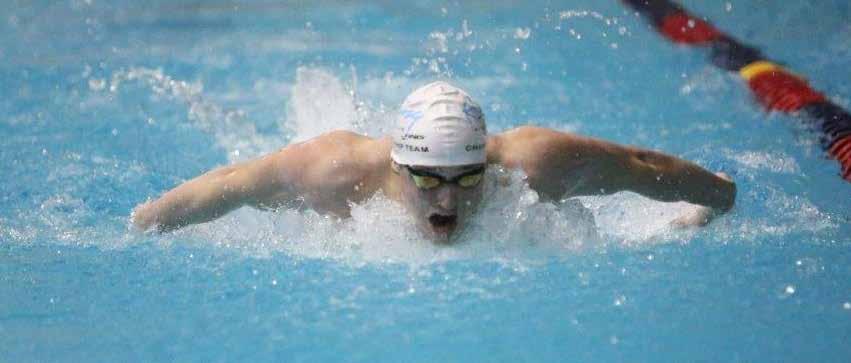
Federal Way, WA. After winter college finals, returned home for a competition at King Aquatic Club where I’ve been a competitor since I was a kid; last heat in the 200-yard butterfly 15 and up, open.
Providence College Cadets; my platoon worked through various drills each week for a 4-hour lab. This is the last one of my sophomore year.
The other part of the mixed messaging came from competition. The entire time, the idea that how we did at CST affected where we ended up in the Army. Constantly trying to compete to increase platoon ranking countered the other philosophy shared in how when we all follow and help others, they will do better. This basic idea of generosity works in a perfect world; however, there are still some who would work as “spotlight rangers,” only working when they were in leadership roles and sandbagging at all other times. While peer evaluations work to counter this somewhat, the cadre with us are not able to be around long enough to truly see how people act.
My experiences at camp truly allowed me to decide the kind of leader I strive to be. One such aspect is to be understanding and kind, not for my own gain, but because it is the right thing. Those that stood out to me were not kind merely to get ahead; they were good and down to earth people, helping and teaching because people needed help. Another aspect is to attempt to lead by example. This has been a lesson learned through years of athletic leadership and numerous coaches. There are leaders that prove themselves through shows of force and putting themselves in the front view, and then there are those that show what they are asking is possible and never asking others to do what they would not. In the end, if I make rational decisions and take care of my people, my leadership will help to guide whatever unit I am a part of to success.
My advanced camp experiences taught me a lot about my leadership style and dealing with mental toughness, as well as the sting of the gas chamber!
